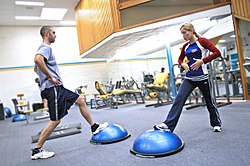
These are some things you should be aware of if you're interested in a career working as a Florida personal training professional. First, you should know how much you can expect to make as an instructor in the Sunshine State. Floridians are known for being outdoors. Many people wish to lose weight and get in good shape. Personal trainers can help clients create sensible exercise and diet plans.
The average salary for a personal trainer is in Florida
Personal trainers work with people to improve their health and physical fitness. These personal trainers can be professional or amateur athletes who are interested in losing weight or getting in shape. These people can design their training and develop relationships with clients. They also offer fitness evaluations. They may earn anywhere from $23,000 to $72,000 annually.
Florida is a great place to become a personal coach. The state is famous for its beaches and lush forests, as well as the hard-core outdoor recreation. There are many personal trainers in the state, so a career here can be very lucrative. As of 2014, the state of Florida employed 13,339 fitness trainers.

Your potential to earn
Florida's fitness industry is flourishing and many people are seeking certified personal trainers. There are many jobs for personal trainers in Florida, such as those at fitness centers, studios, or health clubs. Personal trainers may teach adult classes or work with individuals of various skill levels. Florida offers many opportunities for athletes.
Personal trainers usually start out as employees of commercial gyms and earn close to minimum wage. In order to earn a higher income, they must find clients or be assigned to gym members. Personal trainers usually receive a commission of between 30%-60% of the total fee that clients pay. However, these commissions could drop to 15% to 20% depending on the total amount a client pays per session.
Certifications
Personal training is one of many areas that offers numerous certifications. These certifications are required to be a certified personal trainer. This will enable you earn a lucrative and healthy salary. For example, Florida employers prefer personal trainers who have at least a four year degree and national certification. These certifications provide you with professional development opportunities and benefits, including a retirement program.
Personal trainers often work with their clients one-on-1 to create exercise routines that improve their overall health. They offer information on nutrition and weight management, as well other lifestyle and health issues. They also may be responsible for maintaining equipment and cleaning facilities, and they can also help their clients sell gym memberships or other products.

Cost of living
Florida Personal Trainers make an average salary of $51,728 per annum. The salary range is between $37.451 and $62,022. A Bachelor's Degree in Personal Training is the required level of education. The salary data is based on ERI salary surveys. Cost of living is a measure of the total cost of living and includes costs for food, transportation, health services, rent, utilities, and taxes.
FAQ
How many hours should I sleep each night?
The amount of sleep that is recommended for each individual depends on their age, gender and needs. Most adults need 7 to 9 hours of sleep per day. Children and teenagers need 10 to 12 hours of sleep per night. As they age, however, this number falls.
Is it necessary to eat before exercising?
No. You don't need to eat anything before working out. If you feel hungry after working out, it is a good idea to have a light snack like yogurt or fruit.
Why is it important to get enough rest?
For a healthy lifestyle, sleep is vital. Your body can heal itself and recover from daily stressors by sleeping. Getting adequate sleep each night helps you to function optimally throughout the day.
Statistics
- An estimated 110,000 deaths per year could be prevented (cdc.gov)
- One study showed that adults who watch more than 4 hours of television daily had an 80% higher risk of death from cardiovascular disease. (heart.org)
- Physical activity confers the following maternal and fetal health benefits: a decreased risk of pre-eclampsia, gestational hypertension, gestational diabetes (for example, 30% reduction in risk) (who.int)
- Globally, 81% of adolescents aged 11-17 years were insufficiently physically active in 2016. (who.int)
External Links
How To
How To Burn Belly Fats Faster
Belly Fat is usually seen as a problem when we want to lose weight. If you look at it, belly fat is actually a positive thing. Your organs will be protected by the amount of belly fat. Let's look at how to rapidly lose belly fat.
Lack of exercise and stress are the main reasons we store body fat. Because of its stimulation of the production hormone cortisol, stress can make us feel hungry continuously. Cortisol levels are increased by insulin. The excess calories stored as fat are then stored by insulin. An increased appetite can be caused by a lack of sleep. These extra calories are broken down through exercise.
There are many different ways to reduce bellyfat. Depending on your budget, you can try each one. Here are some tips to help you get rid of belly fat quickly.
-
Reduce your food intake. Don't eat three large meals at once. This will help you consume less calories.
-
Drink lots of water. Water flushes out toxins from your body and keeps you hydrated. Water before each meal can help you feel fuller longer and reduce your appetite so that you don't overeat.
-
Avoid snack foods that are unhealthy. If you're looking for quick fixes, snack foods like chips, cookies, candies, etc. This might be tempting. Avoid these unhealthy treats. They are full of empty calories, too much sugar, and can be very fattening. Choose healthy options like whole grains, fruits, vegetables, nuts, seeds and nuts.
-
Three times per week, strength training is recommended. Strength training increases muscle mass, which can help you burn more calories while still resting. It strengthens bones and muscles, ligaments, muscles, tendons, heart, lungs, as well as joints.
-
Stretching and walking are good habits. Stretching is a great way to increase flexibility and mobility. This helps reduce back pain. Walking is great for burning calories.
-
Reduce alcohol intake. Your diet is empty of calories, and alcohol has no nutritional content.
-
Slowly lose weight. To lose weight, the first step is to determine what your current weight. Then calculate your ideal weight by adding 5% to 10% of your total body weight. Once you have established your ideal weight, reduce your daily calorie intake by 500 to 1000 calories each day until you achieve your goal.
-
Avoid processed foods. These foods are high on sugar, salt, and additives. Processed foods are often very convenient but don't provide enough nutrients to keep you healthy.
-
Don't skip breakfast! Breakfast is good for your concentration, memory, and energy. Protein (like eggs), fiber and complex carbohydrates (like oatmeal) should be included in breakfast.
-
Have regular bowel movements. Gas and bloating can result from irregular bowel movements. This can be prevented by drinking plenty of water and increasing fiber intake.